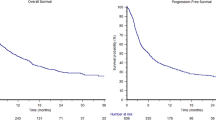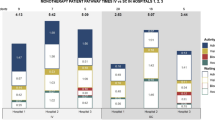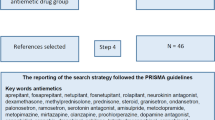Abstract
Purpose
The rate of hypersensitivity reactions in patients receiving carboplatin (CBDCA) has been reported to increase after multiple doses of the agent. However, risk factors for these onsets have not been well described. In this study, we investigated the contribution of the reported risk factors to the onset of CBDCA-related delayed hypersensitivity reactions.
Methods
We reviewed the records of gynecologic cancer patients receiving CBDCA of more than 7 cycles in Mie University Hospital from March 2006 to July 2009. The patients were divided into two groups on the basis of whether hypersensitivity reactions developed (13 patients) or not (43 patients). Thereafter, the potential influences of the patients’ characteristics on the development of CBDCA-related delayed hypersensitivity reactions were explored using logistic regression analyses.
Results
The median CBDCA-free interval (10 months) in patients with hypersensitivity reactions was significantly higher than that (3 months) in patients without hypersensitivity reactions. Logistic regression analyses revealed a CBDCA-free interval >13 months (odds ratio 22.2, 95% confidence interval 2.57–192, p < 0.01) and a maximum dose of CBDCA > 650 mg (odds ratio 9.52, 95% confidence interval 1.04–93.9; p < 0.05) were significantly correlated with the incidence of CBDCA-related delayed hypersensitivity reactions.
Conclusions
Careful attention should be paid to the onset of delayed hypersensitivity reactions for recurrent gynecologic cancer patients receiving CBDCA > 650 mg after an interval of more than 13 months from the previous CBDCA administration.
Similar content being viewed by others
References
Markman M, Kennedy A, Webster K, Elson P, Peterson G, Kulp B, Belinson J (1999) Clinical features of hypersensitivity reactions to carboplatin. J Clin Oncol 17:1141–1145
Schwartz JR, Bandera C, Bradley A, Brard L, Legare R, Granai CO, Dizon DS (2007) Does the platinum-free interval predict the incidence or severity of hypersensitivity reactions to carboplatin? The experience from Women and Infants’ Hospital. Gynecol Oncol 105:81–83
Navo M, Kunthur A, Badell ML, Coffer LW 2nd, Markman M, Brown J, Smith JA (2006) Evaluation of the incidence of carboplatin hypersensitivity reactions in cancer patients. Gynecol Oncol 103:608–613
Koshiba H, Hosokawa K, Kubo A, Miyagi Y, Oda T, Miyagi Y, Watanabe A, Honjo H (2009) Incidence of Carboplatin-related hypersensitivity reactions in Japanese patients with gynecologic malignancies. Int J Gynecol Cancer 19:460–465
Weidmann B, Mülleneisen N, Bojko P, Niederle N (1994) Hypersensitivity reactions to carboplatin. Report of two patients, review of the literature, and discussion of diagnostic procedures and management. Cancer 73:2218–2222
Weiss RB (1992) Hypersensitivity reactions. Semin Oncol 19:458–477
Shepherd GM (2003) Hypersensitivity reactions to chemotherapeutic drugs. Clin Rev Allergy Immunol 24:253–262
Sliesoraitis S, Chikhale PJ (2005) Carboplatin hypersensitivity. Int J Gynecol Cancer 15:13–18
Zanotti KM, Rybicki LA, Kennedy AW, Belinson JL, Webster KD, Kulp B, Peterson G, Markman M (2001) Carboplatin skin testing: a skin-testing protocol for predicting hypersensitivity to carboplatin chemotherapy. J Clin Oncol 19:3126–3129
Cromwell O, Pepys J, Parish WE, Hughes EG (1979) Specific IgE antibodies to platinum salts in sensitized workers. Clin Allergy 9:109–117
O’Cearbhaill R, Zhou Q, Iasonos A, Hensley ML, Tew WP, Aghajanian C, Spriggs DR, Lichtman SM, Sabbatini PJ (2010) The prophylactic conversion to an extended infusion schedule and use of premedication to prevent hypersensitivity reactions in ovarian cancer patients during carboplatin retreatment. Gynecol Oncol (in press)
Syrigou EI, Karapanagiotou EM, Alamara CV, Boura PG, Saif MW, Syrigos KN (2009) Hypersensitivity reactions to oxaliplatin: a retrospective study and the development of a desensitization protocol. Clin Colorectal Cancer 8:106–109
Watanabe Y, Nakai H, Ueda H, Nozaki K, Hoshiai H (2005) Carboplatin hypersensitivity induced by low-dose paclitaxel/carboplatin in multiple platinum-treated patients with recurrent ovarian cancer. Int J Gynecol Cancer 15:224–227
Conflict of interest statement
No author has any conflict of interest.
Author information
Authors and Affiliations
Corresponding author
Rights and permissions
About this article
Cite this article
Sugimoto, H., Iwamoto, T., Murashima, Y. et al. Risk factors contributing to the development of carboplatin-related delayed hypersensitivity reactions in Japanese patients with gynecologic cancers. Cancer Chemother Pharmacol 67, 415–419 (2011). https://doi.org/10.1007/s00280-010-1338-5
Received:
Accepted:
Published:
Issue Date:
DOI: https://doi.org/10.1007/s00280-010-1338-5




